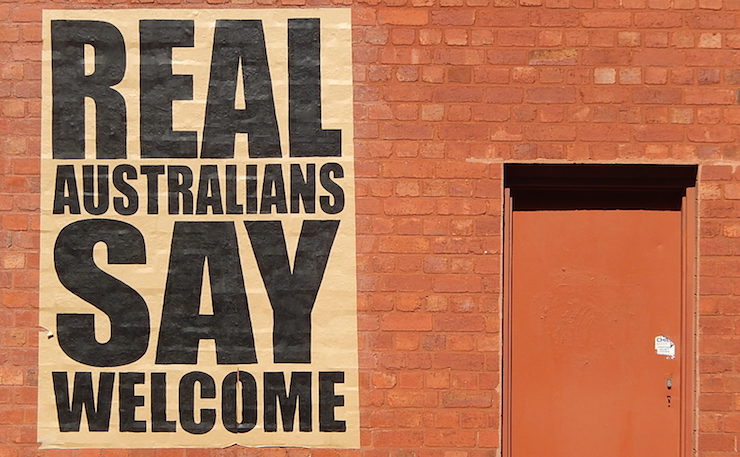OPINION: This year, the choice for progressive voters is clear, writes Liam McLoughlin.
Masochists across Australia cannot wait to vote for Malcolm Turnbull. Despite a feast of arguments against this insane course of action, many will be unable to resist the charms of this smooth-talking turncoat.
For the rest of us, we face a serious choice on Saturday.
Labor? Or the Greens?
Many progressives will vote for Labor out of habit. Some will spurn the Greens based on media-fuelled stereotypes and misinformation. Others will back Labor because of the false belief that voting Greens will help the Liberals win government.
I can’t imagine anyone voting Labor ahead of the Greens based on a detailed comparison of their policy platforms. That’s because across all key areas, Greens policies are far more aligned with progressive values.
Let’s take a look.
Refugees
Labor and Liberal policies are not equally inhumane, but they’re pretty close.
Labor will raise our annual refugee intake to 27,000 by 2025, give $450 million to the UNHCR and abolish Temporary Protection Visas (TPVs).
However, they will continue with offshore prison camps and turning back boats. They have assured the electorate that asylum seekers on Nauru and Manus will not be resettled in Australia. They will continue the detention of children and families and will maintain the Australian Border Force.
The Greens will increase the humanitarian intake to 50,000 people each year. They will spend $500 million for timely processing of asylum seeker claims in Indonesia and Malaysia. They plan to close Manus and Nauru and integrate these asylum seekers into the Australian community. The Greens will also abolish TPVs, release all children from detention and scrap the Australian Border Force.
Verdict: If you want rational and humane immigration policy and you refuse to be complicit in cruelty to refugees, vote Greens.
Climate Change And The Great Barrier Reef

Labor has pledged to cut emissions 45 per cent based on 2005 levels by 2030 and has a 50 per cent renewable energy target for the same year. They will spend $500 million over five years protecting the Great Barrier Reef. They will continue spending billions in fossil fuel subsidies, accepting millions in fossil fuel donations, and won’t rule out approving new coal mines.
The Greens have promised to cut emissions 63-82 per cent by 2030 and have a 90 per cent renewable energy target by that time. A new $500 million government authority called Renew Australia will deliver $5 billion of construction in renewable energy generation over the next four years. They will spend $1 billion helping coal workers transition to a clean economy. The Greens are offering $2.18 billion to save the Great Barrier Reef over five years. They have pledged no new coal or gas approvals and no fossil fuel project expansions.
Verdict: If you want a government fully committed to climate justice and saving the the Reef, vote Greens.
Indigenous Affairs
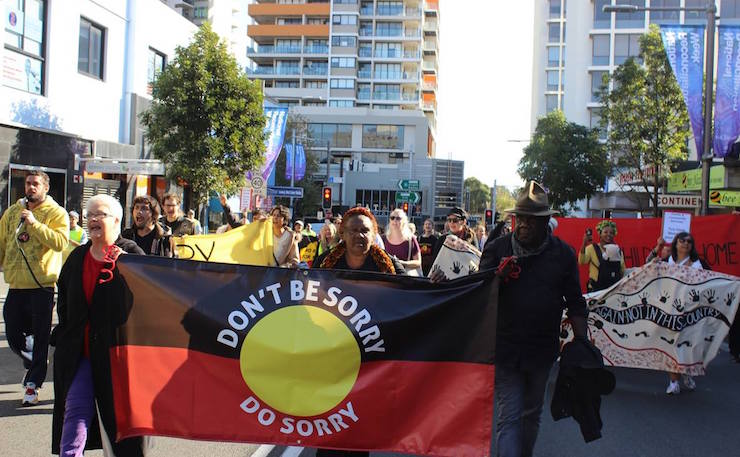
Labor is taking a “strong, practical” approach to Indigenous affairs with several of their “100 Positive Policies” targeting Aboriginal Australians. They will spend $100 million supporting Indigenous students and boosting the number of Indigenous teachers. $9.5 million will go to closing the gap in eye health and vision loss and $8.4 million is earmarked for “empowerment of Indigenous girls and young women”. They intend to reverse the Abbott cuts to Aboriginal and Torres Strait Islander Legal Services and campaign for constitutional recognition.
These are indeed “positive policies”, but Labor’s approach appears piecemeal. In trawling the ALP website I had trouble finding an overarching vision for Indigenous affairs.
The Greens have a more systemic take on achieving justice for Aboriginal people. The first two aims of the Greens policy platform for Indigenous Australians are crucial for securing equity. The first is “A treaty or treaties that recognise the prior occupation and sovereignty of Aboriginal and Torres Strait Islander peoples”. The second is respecting the Aboriginal right to self-determination. They also have the courage to demand an effective native title system and promise to fully implement the recommendations of the 1991 Royal Commission into Aboriginal Deaths in Custody and the 1997 Bringing Them Home Report amongst others.
Specific funding measures include restoring half a billion dollars of Abbott government cuts to Indigenous services as well as an extra $180 million in close the gap initiatives over four years. The Greens will also spend $30 million to help Aboriginal organisations campaign for Treaty, $40 million to reduce incarceration rates, $15 million to restore funding to the National Congress of Australia’s First Peoples, $20 million to implement the UN Declaration on the Rights of Indigenous Peoples, and $20 million to reduce the number of Aboriginal children going into out of home care.
Verdict: If you believe in justice and respect for Indigenous Australians, vote Greens.
HOUSE AD – NEW MATILDA NEEDS YOUR HELP. OUR LATEST FUNDRAISER ON POZIBLE IS HERE. HELP US PAY OUR HUGE LEGAL BILLS AND KEEP INDEPENDENT MEDIA ALIVE!
Health
Labor is clearly a safer bet than the Liberals for good quality public healthcare. They will restore indexation of the Medicare Benefits Schedule and spend $2 billion more on hospitals than the Turnbull government over four years. Yet this goes nowhere near restoring the $57 billion in medium-term funding cut by the Abbott government in 2014. They will also retain the private health insurance rebate.
The Greens will also restore indexation but in addition they will increase the Commonwealth share of hospital funding to 50 per cent, effectively reversing the $57 billion cut. Greens’ policy also includes legislating this funding formula so future governments will need Parliamentary approval to reduce the Commonwealth contribution to hospital funding. They will also phase out the private health insurance rebate, creating $50 billion over a decade to be reinvested in the public system. Their Denticare plan spends $6.6 billion giving children, seniors, pensioners, students and welfare recipients access to publicly funded dental care.
Verdict: If you want to ensure a high quality public health care system for decades to come, vote Greens.
Education
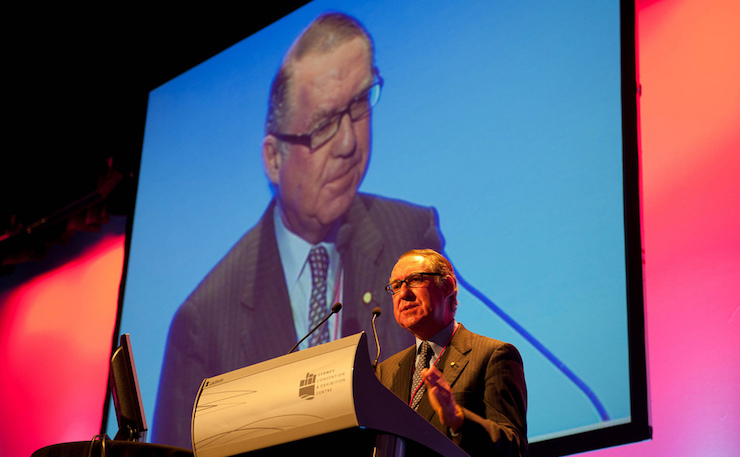
Seen as one of its two strongest policy areas, Labor has promised to fully fund years five and six of Gonski school funding and crack down on private colleges. However, Labor recently reversed its opposition to some higher education cuts, including tying indexation to the consumer price index, forcing students to pay back the debt sooner, and eliminating the HECS-HELP benefit for degrees in education and maths, science, education and nursing.
As well as committing to the full Gonski, the Greens plan to redirect some funding from wealthy private schools to public schools, spend $4.8 billion fully funding disability loading and fund sustainable schools to the tune of $192 million. They will boost TAFE funding by $400 million a year, reverse Coalition cuts to the university sector and increase funding by 10 per cent. They will also inject $1.3 billion into university research.
Verdict: If you believe in education equity, vote Greens.
Aid And Development
The Coalition government has been drastically reducing foreign aid. In 2012-2013, Australia gave $5.057 billion. In 2016-2017, aid will be $3.8 billion, or 0.23 per cent of Gross National Income (GNI). This amount is the least generous ever and contrasts ignominiously with the internationally accepted goal of 0.7 per cent of GNI.
Labor has committed to a target of 0.5 per cent of GNI but will not give a timeline, instead promising an extra $200 million each year.
The Greens target is to reach 0.7 per cent of GNI by 2025-2026. They will spend $7.97 billion over four years increasing our aid budget.
Verdict: If you think a rich nation like Australia should do much more to help some of the world’s poorest people, vote Greens.
The Arts
The Shorten government will restore the Australia Council funding cut by the Abbott government and provide an extra $20 million a year for four years from 2017. They will increase the Regional Arts Fund by $8 million over four years from 2017, allocate $60 million for local TV drama and spend a few million strengthening live music and boosting music in schools.
These measures certainly are something, but they compare unfavourably with the $270 million in extra funding under the Greens arts policy. Beyond restoring Australia council funding, the Greens will double the money available for Australia Council Grants and Initiatives for small and medium organisations and individuals. They will create an Arts Research and Development Grants program, establish a National Arts Week and propose a living wage for unemployed artists.
Verdict: If you think a flourishing arts sector is an important part of thriving nation, vote Greens.
The Economy And Industrial Relations
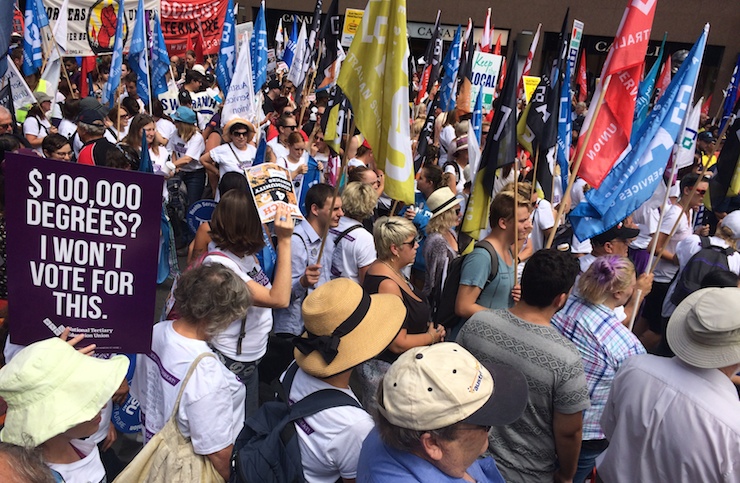
Labor supports the government’s personal income tax breaks for middle income earners and company tax cut for small businesses. They will restrict negative gearing on new homes from July 2017 and halve the Capital Gains Tax discount on new investments. They will continue business as usual on fossil fuel donations and subsidies.
Labor opposes the Australian Building and Construction Commission (ABCC) and says it would abide by the decision of the Fair Work Commission on penalty rates. They also want to reduce insecure work with an objective test for deciding a worker’s casual status.
The Greens go much harder than Labor on taxing individual wealth, corporate accumulation and fossil fuels. They oppose the income and company tax cuts supported by Labor. They will introduce the Buffet Rule, limiting deductions for the top one per cent and generating $35 billion by 2025, to be invested in public services and infrastructure. They support a progressive super tax based on a person’s marginal income tax as oppose to the flat rate of 15 per cent supported by the major parties.
They have 18 measures targeting corporate tax avoidance, raising an extra $1.7 billion over four years. The Greens’ proposals to phase out negative gearing and capital gains tax discounts will generate $120 billion over ten years.
The Greens will also end fossil fuel subsidies and donations, price pollution from mining and charge a thermal coal export levy.
The idea that the Greens are somehow irresponsible economic managers is baseless. All parties subject their costings to the Parliamentary Budget Office so no single party has a monopoly on credible financial projections. Due to these revenue measures and others, the Greens would reduce the deficit more than either Labor or the Liberals.
The Greens also have stronger policies on industrial relations. They too oppose the ABCC but they also want to legislate the protection of Sunday penalty rates. Their approach to reducing insecure work is to actually give the Fair Work Commission powers to convert long-term casual employees to permanent employees.
Verdict: If you think workers deserve stronger protection and you believe the rich and polluting should pay their fair share to help fund a decent society, vote Greens.
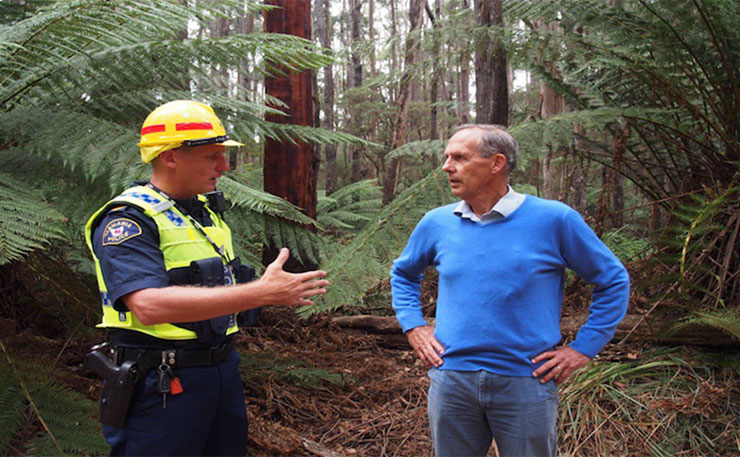
In 2010, Greens leader Bob Brown and incoming PM Julia Gillard signed a deal to ensure lower house MP Adam Bandt would support a Labor minority government. In return, Labor agreed to work towards a referendum on constitutional recognition for Indigenous people, a carbon price, and reforms to the political donations system. They also agreed to pursue Greens policies to improve the conduct of parliamentary business. One such measure was establishing the Parliamentary Budget Office (PBO) and The Saturday Paper recently documented just how positive the PBO has been for Australian politics.
Right-wing politicians and sections of the media talk about the nightmarish chaos and instability of this time of minority government. Professor of political science at the Australian National University, John Warhurst, had a more objective reading in the Sydney Morning Herald. He described the Gillard government as “a successful minority government which executed a considerable legislative program under extreme pressure”. Prior to Rudd’s return, parliament passed 561 bills, including legislation on the NBN, a carbon price, the NDIS and Gonski school funding.
So much for the terrors of a Labor-Greens minority government.
Richard Di Natale has said if the Greens are in a position to negotiate a minority government with Labor, they will demand more compassionate refugee policy, stronger climate action, a ban on corporate donations and a federal anti-corruption body.
Yes please.
If you care about the unjust foundations of our society, the corrupt condition of our democracy, and the fragile state of our ecosystem, vote 1 Greens this Saturday.
HOUSE AD – NEW MATILDA NEEDS YOUR HELP. OUR LATEST FUNDRAISER ON POZIBLE IS HERE. HELP US PAY OUR HUGE LEGAL BILLS AND KEEP INDEPENDENT MEDIA ALIVE!
Donate To New Matilda
New Matilda is a small, independent media outlet. We survive through reader contributions, and never losing a lawsuit. If you got something from this article, giving something back helps us to continue speaking truth to power. Every little bit counts.

